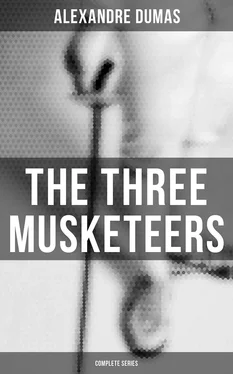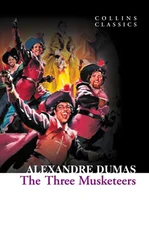“I agree to it, too,” said Porthos, “if d’Artagnan approves of it. D’Artagnan, being the bearer of the letter, is naturally the head of the enterprise; let him decide, and we will execute.”
“Well,” said d’Artagnan, “I decide that we should adopt Athos’s plan, and that we set off in half an hour.”
“Agreed!” shouted the three Musketeers in chorus.
Each one, stretching out his hand to the bag, took his seventy-five pistoles, and made his preparations to set out at the time appointed.
Table of Contents
At two o’clock in the morning, our four adventurers left Paris by the Barriere St. Denis. As long as it was dark they remained silent; in spite of themselves they submitted to the influence of the obscurity, and apprehended ambushes on every side.
With the first rays of day their tongues were loosened; with the sun gaiety revived. It was like the eve of a battle; the heart beat, the eyes laughed, and they felt that the life they were perhaps going to lose, was, after all, a good thing.
Besides, the appearance of the caravan was formidable. The black horses of the Musketeers, their martial carriage, with the regimental step of these noble companions of the soldier, would have betrayed the most strict incognito. The lackeys followed, armed to the teeth.
All went well till they arrived at Chantilly, which they reached about eight o’clock in the morning. They needed breakfast, and alighted at the door of an AUBERGE, recommended by a sign representing St. Martin giving half his cloak to a poor man. They ordered the lackeys not to unsaddle the horses, and to hold themselves in readiness to set off again immediately.
They entered the common hall, and placed themselves at table. A gentleman, who had just arrived by the route of Dammartin, was seated at the same table, and was breakfasting. He opened the conversation about rain and fine weather; the travelers replied. He drank to their good health, and the travelers returned his politeness.
But at the moment Mousqueton came to announce that the horses were ready, and they were arising from table, the stranger proposed to Porthos to drink the health of the cardinal. Porthos replied that he asked no better if the stranger, in his turn, would drink the health of the king. The stranger cried that he acknowledged no other king but his Eminence. Porthos called him drunk, and the stranger drew his sword.
“You have committed a piece of folly,” said Athos, “but it can’t be helped; there is no drawing back. Kill the fellow, and rejoin us as soon as you can.”
All three remounted their horses, and set out at a good pace, while Porthos was promising his adversary to perforate him with all the thrusts known in the fencing schools.
“There goes one!” cried Athos, at the end of five hundred paces.
“But why did that man attack Porthos rather than any other one of us?” asked Aramis.
“Because, as Porthos was talking louder than the rest of us, he took him for the chief,” said d’Artagnan.
“I always said that this cadet from Gascony was a well of wisdom,” murmured Athos; and the travelers continued their route.
At Beauvais they stopped two hours, as well to breathe their horses a little as to wait for Porthos. At the end of two hours, as Porthos did not come, not any news of him, they resumed their journey.
At a league from Beauvais, where the road was confined between two high banks, they fell in with eight or ten men who, taking advantage of the road being unpaved in this spot, appeared to be employed in digging holes and filling up the ruts with mud.
Aramis, not liking to soil his boots with this artificial mortar, apostrophized them rather sharply. Athos wished to restrain him, but it was too late. The laborers began to jeer the travelers and by their insolence disturbed the equanimity even of the cool Athos, who urged on his horse against one of them.
Then each of these men retreated as far as the ditch, from which each took a concealed musket; the result was that our seven travelers were outnumbered in weapons. Aramis received a ball which passed through his shoulder, and Mousqueton another ball which lodged in the fleshy part which prolongs the lower portion of the loins. Therefore Mousqueton alone fell from his horse, not because he was severely wounded, but not being able to see the wound, he judged it to be more serious than it really was.
“It was an ambuscade!” shouted d’Artagnan. “Don’t waste a charge! Forward!”
Aramis, wounded as he was, seized the mane of his horse, which carried him on with the others. Mousqueton’s horse rejoined them, and galloped by the side of his companions.
“That will serve us for a relay,” said Athos.
“I would rather have had a hat,” said d’Artagnan. “Mine was carried away by a ball. By my faith, it is very fortunate that the letter was not in it.”
“They’ll kill poor Porthos when he comes up,” said Aramis.
“If Porthos were on his legs, he would have rejoined us by this time,” said Athos. “My opinion is that on the ground the drunken man was not intoxicated.”
They continued at their best speed for two hours, although the horses were so fatigued that it was to be feared they would soon refuse service.
The travelers had chosen crossroads in the hope that they might meet with less interruption; but at Crevecoeur, Aramis declared he could proceed no farther. In fact, it required all the courage which he concealed beneath his elegant form and polished manners to bear him so far. He grew more pale every minute, and they were obliged to support him on his horse. They lifted him off at the door of a cabaret, left Bazin with him, who, besides, in a skirmish was more embarrassing than useful, and set forward again in the hope of sleeping at Amiens.
“MORBLEU,” said Athos, as soon as they were again in motion, “reduced to two masters and Grimaud and Planchet! MORBLEU! I won’t be their dupe, I will answer for it. I will neither open my mouth nor draw my sword between this and Calais. I swear by—”
“Don’t waste time in swearing,” said d’Artagnan; “let us gallop, if our horses will consent.”
And the travelers buried their rowels in their horses’ flanks, who thus vigorously stimulated recovered their energies. They arrived at Amiens at midnight, and alighted at the AUBERGE of the Golden Lily.
The host had the appearance of as honest a man as any on earth. He received the travelers with his candlestick in one hand and his cotton nightcap in the other. He wished to lodge the two travelers each in a charming chamber; but unfortunately these charming chambers were at the opposite extremities of the hotel. d’Artagnan and Athos refused them. The host replied that he had no other worthy of their Excellencies; but the travelers declared they would sleep in the common chamber, each on a mattress which might be thrown upon the ground. The host insisted; but the travelers were firm, and he was obliged to do as they wished.
They had just prepared their beds and barricaded their door within, when someone knocked at the yard shutter; they demanded who was there, and recognizing the voices of their lackeys, opened the shutter. It was indeed Planchet and Grimaud.
“Grimaud can take care of the horses,” said Planchet. “If you are willing, gentlemen, I will sleep across your doorway, and you will then be certain that nobody can reach you.”
“And on what will you sleep?” said d’Artagnan.
“Here is my bed,” replied Planchet, producing a bundle of straw.
“Come, then,” said d’Artagnan, “you are right. Mine host’s face does not please me at all; it is too gracious.”
“Nor me either,” said Athos.
Читать дальше












